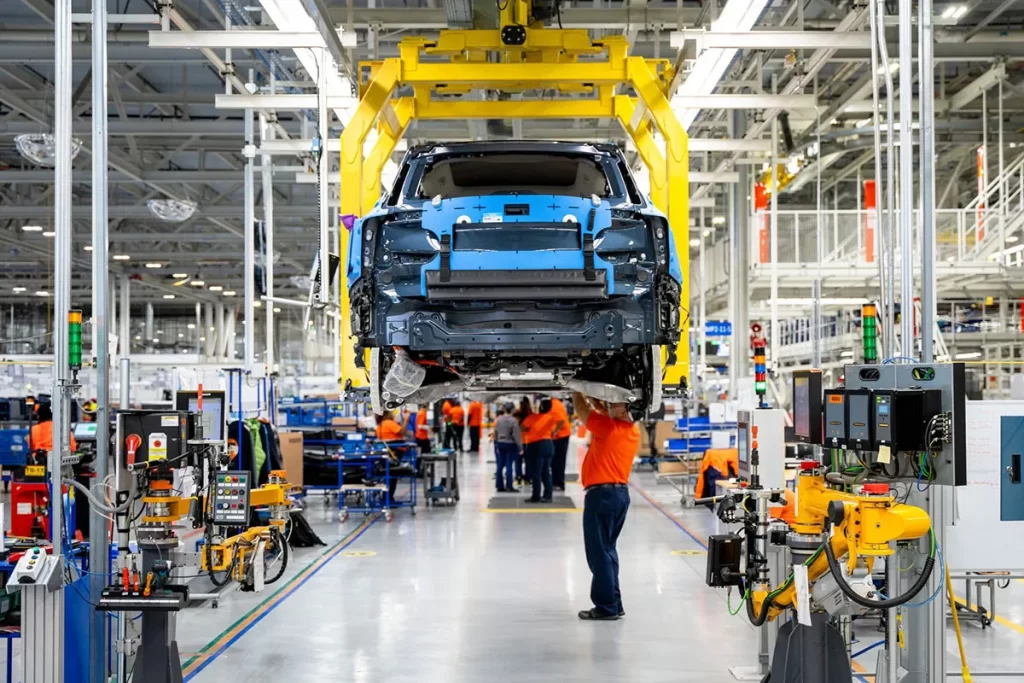
South Carolina officials say they’re still determined to transform the Palmetto State into a global powerhouse in electric vehicle (EV) and battery manufacturing, despite delays in major projects.
An economic driver in that unwavering commitment is almost $1 billion in new federal funding announced in recent weeks, on top of millions of dollars in subsidies already provided by the S.C. General Assembly.
“South Carolina remains bullish on the industry and [its] role in our economy – and creating opportunities for all South Carolinians,” S.C. Commerce Department spokesman Alex Clark said this week. “Many of our large, announced projects are already under construction and starting to make their mark on local communities [and] the local economy.”
Five of those local projects got major boosts on Sept. 20 with the announcement of $850 million in federal funding under 2021’s Infrastructure Investment and Jobs Act (IIJA), better known as the Bipartisan Infrastructure Law. The recipients were:
- Cirba Solutions, Columbia: $200 million for a new facility to recycle lithium-ion batteries obtained from electric vehicles, energy storage systems, end-of-life consumer materials.
- EnerSys Advanced Systems, Piedmont: $199 million to construct a 500,000 square foot lithium-ion battery cell manufacturing facility that’s expected to begin production in 2028.
- Clarios Circular Solutions, Florence: $150 million to retrofit an existing Clarios facility to recycle lithium-ion battery production scrap for about 200,000 new EV batteries annually.
- SKI US, Inc., Orangeburg: $150 million to produce graphite, a material necessary for electrical conduction in EV batteries, using a new process that makes it cost-effective under U.S. environmental standards.
- American Battery Technology Company.: $150 million to build a new lithium-ion battery recycling facility to process approximately 100,000 tons of battery materials per year at an S.C. site to be determined.
All totaled, the projects are expected to create about 1,500 permanent, full-time jobs.
“In positioning South Carolina as a leader in the battery manufacturing space,” U.S. Rep. James Clyburn, D-S.C., said in a press statement, “the Biden-Harris administration is connecting communities to opportunity throughout the state for generations to come as we continue our transition toward a clean energy economy.”
Recent setbacks
Despite continuing commitments at the federal and state levels, experts say 2024 is a challenging time for automotive and battery manufacturers, with softer-than-expected demand for EVs, particularly in the U.S.
As a result, car companies have recently announced major cutbacks in planned EV production. Meanwhile, the price of lithium, a rare metal used in modern batteries, has fallen more than 80% over the past two years, reflecting significant oversupply in the context of weakened demand.
In S.C., those issues have led to delays in a number of major projects, most notably an indefinite pause in the construction of a $1.3 billion lithium production facility in Chester County.
“Currently, two main elements are driving consumer demand and those come down to price and convenience,” University of South Carolina economist Joseph Von Nessen said in an interview.
And while prices are starting to become competitive with traditional automobiles, Von Nessen explained, convenience of EVs for consumers is still a major roadblock to widespread adoption.
“When we talk about convenience, that primarily means battery life and the availability of charging stations,” Von Nessen said. “And it’s still very much an open question as to how quickly those elements will improve.”
“Moving up in the value chain”
With more than $12 billion in federal, state and private investments and almost 11,000 new jobs promised in current projects, South Carolina is betting big on EVs and the batteries that power them.
“EV-related companies account for more than half of the $10.27 billion in economic development South Carolina announced last year [and] that speaks to our state’s great potential to lead in this sector,” Gov. Henry McMaster, long a champion of EV manufacturing, said in February 2023. “Our business-friendly climate and our greatest resource – our people – make South Carolina the place where the EV industry can transform the future.”
This week, the Commerce Department’s Clark called that transformation “critical” – particularly given the 75,000 S.C. jobs that already rely on a healthy automotive sector fueled by tire production, vehicle manufacturing, logistics and engineering, port operations and more..
“The industry is currently undergoing the largest transformation in the last 100 years as it shifts from the gasoline combustion engine to the electric vehicle,” Clark said. “It is imperative for South Carolina to be part of this transformation in order to secure our existing jobs and to create jobs that will last into the future.”
According to Von Nessen, those sentiments square with the long-term projections, though there are still important questions to be answered.
“Demand is coming, but the timing is very uncertain,” he said. “And where that demand will land is also uncertain. Are we talking about a market where 50% of new vehicles are EVs in 10 or 15 years or does it stabilize at 30 to 40%?”
Nevertheless, he says, EVs and batteries represent an opportunity for South Carolinians to profit from auto manufacturing in a way they never have in the past.
“If we look at auto manufacturing to date, one of the things we don’t make in South Carolina is engines, which is the highest value-add of a vehicle,” Von Nessen said. “And so, by focusing on electric motor and battery production, that allows us to move up in the value chain, which will be very beneficial to the state in the long run.”
- Have a comment? Send to: feedback@statehousereport.com.


